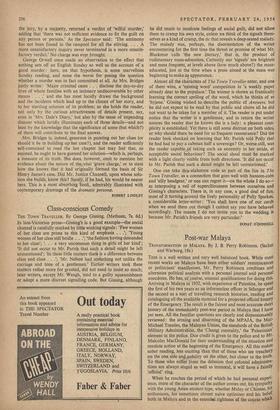Class-conscious Comedy
THE TOWN TRAVELLER. By George Gissing. (Methuen, 7s. 6d.) IN late-Victorian prose—Gissing's is a good example—the social channel is carefully marked by little winking signals : 'Few women of her class are prone to this kind of emphasis . . .'; 'Young women of her class still bridle . . .'; 'the fashion having descended to her class'; . . a very uncommon thing in girls of her kind'; 'It did not occur to Mr. Parish that such a detail might be left unmentioned'; 'In these little matters there is a difference between class and class . . .'; `Mr. Nelson had something not unlike the carriage and tone of a gentleman.' Earlier writers took these matters rather more for granted, did not need to insist so much; later writers, except Mr. Waugh, tend to a guilty squeamishness or adopt a more discreet signalling code. But Gissing, although
he did much to inculcate feelings of social guilt, did not allow them to cramp his own style, unless we think of the signals them-
selves as a kind of cramp, the tic that reveals a deep-seated malady.
The malady was, perhaps, the disorientation of the writer encountering for the first time the threat or promise of what Mr.
Blackmur calls 'the new literacy,' that is, the product of rudimentary mass-education. Certainly our 'signals' are brightest and most frequent, at levels above (how much above?) the mass- educated, just at the time when a press aimed at the mass was beginning to make its appearance.
Almost all the characters of The ToWn Traveller enter, and one of them wins, a 'missing word' competition in 'a weekly paper.
already dear to the populace.' The winner is shown as frantically learning the correct spelling of the word, which he thinks of as 'hyjene.' Gissing wished to describe the public of Answers, but he did not expect to be read by that public and above all he did not want to be taken for a member of it. The reader is put under notice that the writer is a gentleman, and in return the writer assures the reader that he knows she is a lady: a pleasant com- plicity is established. Yet there is still some distrust on both sides, or why should there be need for so frequent reassurance? Did the reader look shocked on learning that Mr. Parish told Polly that he had had to pay .a cabman half a sovereign? Or, worse still, was the reader capable of taking such an enormity in her stride, as acceptable social behaviour? The social shoal must be marked with a light clearly visible from both directions. 'It did not occur to Mr. Parish that such a detail might be left unmentioned.'
One can take this elaborate code as part of the fun in The Town Traveller, as a connection that goes well with hansom-cabs and 'silly headgear,' or one can regret it—on the whole I do so— as interposing a veil of superciliousness between ourselves and Gissing's characters. There is, in any case, a good deal of fun, most of it turning around the lively personality of Polly Sparkes, a considerable letter-writer : 'You shall have one of our cards when we send them out though I cannot say you have behaved accordingly. The reason I do not invite you to the wedding is because Mr. Parish's friends are very particular.'
DONAT O'DONNELL


































 Previous page
Previous page